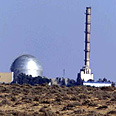
Dimona nuclear research center
צילום: רויטרס
Report: Israel asks atom export changes
Official at UN nuclear watchdog say Israel has asked nuclear exporters to adjust non-proliferation rules to help it build safe civilian atomic plants
Israel has asked nuclear exporters to consider adjusting non-proliferation rules to help it build safe civilian atomic plants, a senior official said.
Some diplomats in Vienna, headquarters of the UN atomic watchdog, said Israel recently approached the Nuclear Suppliers Group about a possible exemption from NSG technology controls, like that sought by Washington for an accord with India.
Such a waiver could raise a storm in the Middle East where Israel's Arab neighbours and Iran have long condemned its presumed regional monopoly in nuclear arms, never confirmed or denied, and its shunning of the Non-Proliferation Treaty (NPT).
A senior Israeli official denied Israel had sought any waiver, but said the Jewish state had asked for criteria-based changes in rules to help non-NPT states acquire less sensitive technology for expanding safe use of atomic energy.
"(This) would considerably enhance the non-proliferation regime by controlling further dissemination of sensitive nuclear technology and drawing outlier (non-signatory) states closer to the regime, while allowing for legitimate access to much less sensitive technology for other states based on their credentials
"The latter pertains especially to states that, like Israel, are interested in building nuclear power reactors, subject to IAEA safeguards, designed to meet the growing need for energy generation in a manner that does not contribute to global warming," the official said.
He called reports that Israel had sought a full exemption from NSG rules "Grossly inaccurate and fundamentally misleading.
"Israel, unlike India, has never asked the NSG for any exemption to its supply guidelines," said the official, asking for anonymity due to the topic's political sensitivity.
Israel said in August it was considering plans to build a nuclear power station in its Negev desert, due to concerns about dwindling natural energy resources worldwide and environmental damage caused by using coal.
Seeking 'less sensitive' technology
The United States' nuclear technology accord with India is controversial and faces resistance to ratification by the US Congress. New Delhi has never joined the NPT, and stealthily developed and tested atom bombs.To take effect, the US-India deal will require a waiver from the NSG, which governs global atomic trade, blocking exports to non-NPT states and other suspected proliferators such as Iran, which denies such charges.
A senior European diplomat said Israel, a close US ally, inquired a few months ago about so-called "Associate status" in the NSG. But many members of the body, which decides matters by consensus, opposed the idea at a recent meeting in South Africa.
"The response of most member states was that they would be reluctant, not specifically regarding Israel, to accord any country any kind of associate or observer status," he said.
"Pakistan has made similar approaches. Countries in a situation like India, not being NPT members, are trying to sort out possibilities of how they could benefit from India's example, its special situation. Nothing has come of it."
Undersecretary of State Nicholas Burns, Washington's point man on the India deal, said in July the United States was not going to push for a similar exemption for any other nation.
How the secretive NSG will treat India's case is unknown.
The Bush administration touts the India accord as fostering strategic ties between the world's two biggest democracies and opening a huge new nuclear market. It argues India has played by
NSG export rules while outside the NPT.










